
Publisher:
Bonnie King
CONTACT:
Newsroom@Salem-news.com
Advertising:
Adsales@Salem-news.com

~Truth~
~Justice~
~Peace~
TJP
Jan-07-2013 15:04

 TweetFollow @OregonNews
TweetFollow @OregonNews
Tipping Point or Turning Point? A Watershed Speech at the Opera
Dr. Franklin Lamb Notes From Damascus Salem-News.comMr. Assad, in what historians and Middle East analysts may well dub an historic speech, offered a new plan to immediately end the crisis...
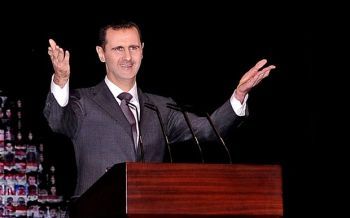 Bashar al Assad Presidential Address |
(DAMASCUS, Syria) - Damascus -- Easy walking distance from this observer’s hotel near the city center, the Damascus Opera House, the site of yesterday’s Presidential address, was inaugurated in May of 2004 by the President and his wife, completing a project of his late father, Hafez, who actually planned the opera house in detail, but which had been put on hold since the late 1970’s. Located off Umayyad Square, the multipurpose culture center complex, presented its most recent opera, Wolfgang Amadeus Mozart’s, The Marriage of Figaro, just months before the current crisis erupted.
Damascus Opera House |
The nearly 1,400 seating capacity Opera Theater was packed for yesterday's presidential address, and as in the final scene of Mozart’s Opera, the conclusion of Bashar Assad’s performance was followed by, as Mozart wrote, “a night-long celebration” among many of his supporters here in Damascus.
Bashar Assad’s glory, as he tried to leave the stage last night and was swarmed by scores of admirers, may not have been that of Caesar’s, during the Gallic wars as the latter also portrayed a domestic crisis and challenge as a defensive struggle to save “Rome”. And granted, it is unlikely that Syria’s president will appear to his critics as posh as John Kennedy at Vienna’s Opera House.
But the man connected with his audience (s) during his watershed speech.
He excelled in delivery, content and, most critically, stating and advocating what he believes is his countryman’s case. While welcoming foreign advice on how to end the current crisis, he insisted that the Syrian people throughout their history of resistance to occupation and hegemony have rejected the orders from certain governments he referred to, in the current crisis, as the “masters of the puppets” who are every day causing death, destruction and deprivations across the Syrian Arab Republic.
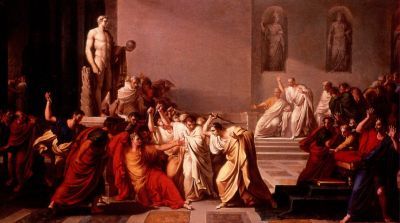 Vincenzoca Muccini The ides of march-1800 |
Admittedly sleep deprived, this observer, as he listened to Bashar Assad’s address was reminded of a Macbeth or Brutus soliloquy. I could not help but transpose in my mind Brutus’ plea in Act 3, Scene 2 of Shakespeare’s Julius Caesar:
| “ |
Who is here so rude or unpatriotic that would not be a Syrian? |
” |
Following his presidential address to the nation, one local journalist, who is sometimes critical of the regime, elaborated--in answer to my question about Assad’s apparent enduring popularity during this tragic period for people of Syria:
“It’s true. And it’s partly due to the fact that he is modest, even humble-- and well-educated in contrast to some regional monarchs who are essentially illiterate and uninterested in the world outside their fiefdoms palaces.” She continued, “Before the crisis it was not unusual to spot him, without a security convoy, driving himself around downtown, his car full of kids- doing errands or taking them out to eat-sometimes collecting them from school. You saw his almost boyish charm yesterday as he entered the hall and made his way down the aisle to the podium as he greeted members of the audience. As he departed he did not appear in a hurry as he shook hands. Bashar Assad obviously enjoys being among people and is not at all a sullen remote type personality as some critics wrongly portray him.”
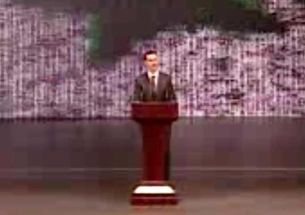 Courtesy: Syrian State Television |
Following the speech, when the lovely chamber maid who daily spruces up my hotel room came dropped by in early evening to do something, I was reading and watching the news. They showed a clip of the president delivering his noontime speech. She lit up when she saw Bashar, spontaneously walked across the room, wrapped her arms around the TV set and hugged it while kissing the screen. I noticed that the lady’s hands were wet and became fearful that the dear woman might get electrocuted!
One well known politically connected Sheik in Damascus offered his view last night to this observer that Assad’s message was to the Syrian people and to his country’s foreign friends and to those who are neutral--and not to his governments enemies. He also suggested that the President will deliver two more speeches in the near future, the next one perhaps having a “FDR fireside chat” format. The Sunni Sheik referred to yesterday’s speech as the first of three “victory” speeches he expected to be delivered.
He also spoke about the UAE and Saudi Arabia in relation to what was happening in Syria and the fact that they are experiencing challenges of their own. In the case of the Saudi Kingdom, and against the backdrop of increased Iran-Saudi consultations regarding Syria, the ill health of King Abdullah and the evident succession power struggle which has intensified recently, with some of the royal family potentates reportedly being strongly opposed to the current campaign to undermine the Assad regime. The Syrian government, despite its detractors, is seen by many in the Gulf countries as being pedigree Arab nationalists with a history of mutual respect for other countries.
The Sheik also sees signs of the Obama administration backing off from its covert war against Syria partly due to the fractured and often coherent message coming from various spokesman of the misnomered “coalition.”
Mr. Assad, in what historians and Middle East analysts may well dub an historic speech, offered a new plan to his countrymen, friends and foes alike, and to the international community to immediately end the crisis.
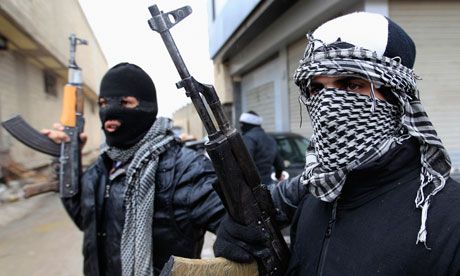
It includes, in sequential order:
- foreign countries to stop financing the rebels;
- Syria’s government putting down its arms and declaring an amnesty;
- a national conference and dialogue;
- the drafting of a constitution approved by referendum;
- a coalition government, presumably until the holding of elections scheduled for 2014.
One Congressional staffer on the US Senate Foreign Relations Committee emailed late today that the Obama administration may well be willing to accept Bashar Assad’s “Damascus Opera House” formula given the fast changing geopolitical reality the region and the military stalemate on the ground in Syria. Both facts suggesting that there is no realistic alternative to the current elected government or that there is much of a realistic prospect that the regime will throw in the towel or collapse anytime soon.
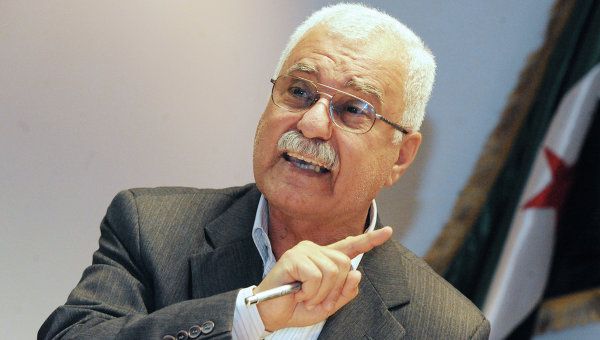 George Sabra Photo: en.rian.ru |
The Congressional staffer, who works on US-Middle East issues, also believes that the incoming Secretary of State, John Kerrey and the likely new Secretary of Defense Chuck Hagel, who will face a tough Senate confirmation fight, but will likely survive it, would go along.
In contract to President Assad’s speech this morning, one of the leaders of the so-called opposition, George Sabra, did not appear capable of offering much to aid the process of ending the current crisis in Syria.
Said Mr. Sabra, “No one could possibly think about dialogue or working with this regime in any way. It is not a possibility. It is out of the question.”
This may not be the evolving international view.
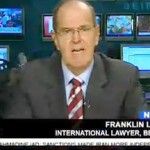
Dr. Franklin Lamb is Director of the Sabra Shatila Foundation. Contact him at: fplamb@sabrashatila.org. He is working with the Palestine Civil Rights Campaign in Lebanon on drafting legislation which, after 62 years, would, if adopted by Lebanon’s Cabinet and Parliament grant the right to work and to own a home to Lebanon’s Palestinian Refugees. One part of the PCRC legislative project is its online Petition which can be viewed and signed at: petitiononline.com/ssfpcrc/petition.html. Lamb is reachable at fplamb@palestinecivilrightscampaign.org.
Franklin Lamb’s book on the Sabra-Shatila Massacre, International Legal Responsibility for the Sabra-Shatila Massacre, now out of print, was published in 1983, following Janet’s death and was dedicated to Janet Lee Stevens. He was a witness before the Israeli Kahan Commission Inquiry, held at Hebrew University in Jerusalem in January 1983.
 |
 |
 |
Articles for January 6, 2013 | Articles for January 7, 2013 | Articles for January 8, 2013
Salem-News.com:





Terms of Service | Privacy Policy
All comments and messages are approved by people and self promotional links or unacceptable comments are denied.
[Return to Top]
©2025 Salem-News.com. All opinions expressed in this article are those of the author and do not necessarily reflect those of Salem-News.com.